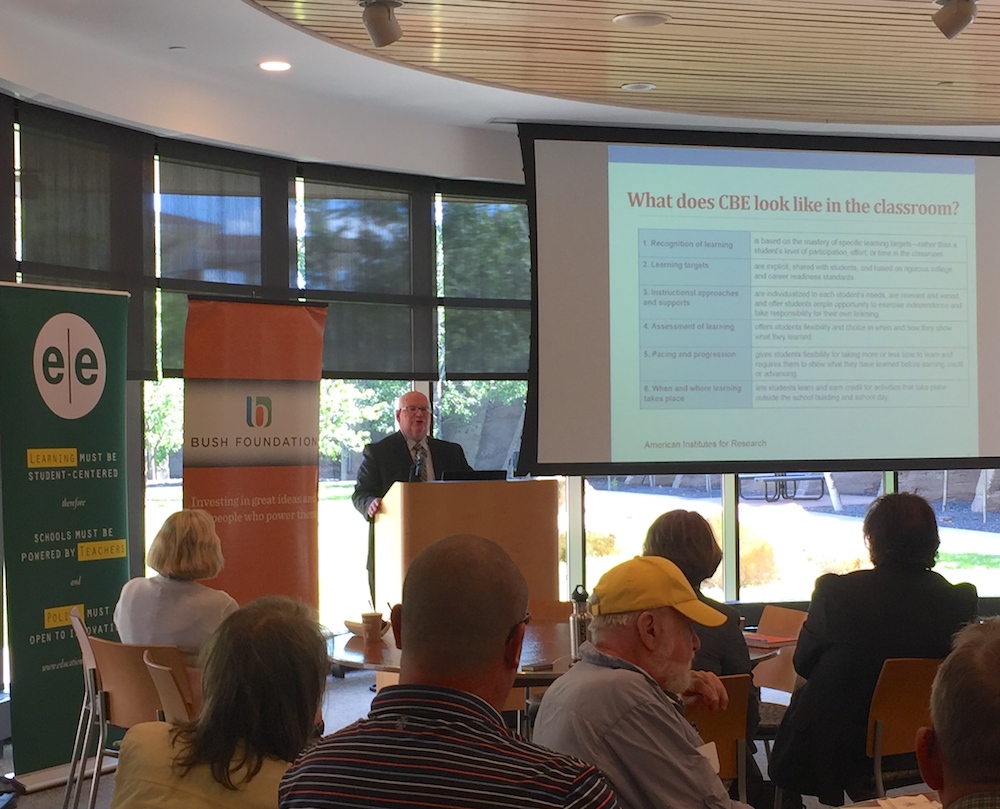“How can you meet the needs of each student?” New Hampshire’s Deputy Commissioner Paul Leather asked a crowd of teachers, administrators, legislators, and organizational leaders. “Hold that question in your mind as you do the work.”
Last Thursday, about 100 attendees gathered to hear and learn about New Hampshire’s first-of-its-kind Performance Assessment of Competency Education (PACE) state accountability system from two of its architects—Deputy Commissioner Leather, and the state’s PACE curriculum director, Ellen Hume-Howard.
Hosted by Education Evolving and the Bush Foundation, the talk focused on how New Hampshire has implemented and embedded competency-based education—when students progress as they demonstrate mastery of academic content, regardless of time, place, or pace of learning—into their state accountability system.

PACE: Reducing Standardized Tests and Trusting the Teachers
In 2014, New Hampshire applied for and received a waiver from the US Department of Education (USDE) to pilot their competency-based education accountability system in four districts. Since then, it has grown to include nine districts that serve 10 percent of New Hampshire’s students.
A central feature of the PACE pilot is that it reduces the amount of standardized state testing. Under federal law, students must take the statewide mathematics and reading assessments in grades 3-8, and once in high school. However, in the PACE pilot, students only take the reading standardized assessment in 3rd and 8th grade, the mathematics assessment in 4th and 8th grade, and the SAT in 11th grade.
In the other years, students take common PACE performance-based assessments. Hume-Howard provided several examples of these assessments, which range in topics from a “Speed Stacking Challenge,” where students connect real-world experiences to their math work with decimals, to first person narrative journals where students write about how their character deals with social issues.
According to Deputy Commissioner Leather, one of the exciting things about PACE is not necessarily that the standardized testing is reduced, but rather that the performance-based assessments that replace them are seamlessly integrated into the curriculum. Hume-Howard drove this point home, “Our assessments are not events.”
Another important component of the PACE system is the trust and responsibility that the state has given to the teachers. The common PACE performance-based assessments have been designed by the state’s teachers, and are used for calibration purposes to verify reliable administration and student proficiency determinations across schools and districts. According to Hume-Howard, “Greater educator agency leads to greater student agency, which is where you get the joy and engagement.”
Is PACE Working?
PACE just finished up its third year and, according to Deputy Commissioner Leather and Hume-Howard, the preliminary results are incredibly promising. While they were cautious about ascribing too much to PACE this early in the pilot, they did share some early figures.
Grade 8 PACE students are outperforming their peers in reading and mathematics proficiency on the state Smarter Balanced tests. Also, PACE students with an individualized education plan (IEP) have higher proficiency rates than their non-PACE peers. Additionally, for grade 3 reading and grade 4 mathematics, the percentage of students who are proficient is growing at a faster rate for the PACE students, than for the non-PACE students.
Lessons from PACE for Minnesota?
During his presentation, Deputy Commissioner Leather commended Minnesota for enacting the Innovation Research Zones Pilot Program during the 2017 legislative special session. The law creates the opportunity for up to six partnerships—three in the metro and three in greater Minnesota—to implement and research innovative approaches to learning.
While the current law does not yet contain the flexibility needed to implement a competency-based accountability system, Deputy Commissioner Leather commented that, in general, “innovation zone” type arrangements are great places to try new models. They allow states to experiment with a new approach with a smaller subset of districts and schools who are ready, rather than going all-in at once. In a sense, the PACE pilot is an accountability-focused “innovation zone” in New Hampshire.
If your school or district might be interested in implementing competency-based education or in innovation zones, please email us at info@educationevolving.org.
Found this useful? Sign up to receive Education Evolving blog posts by email.